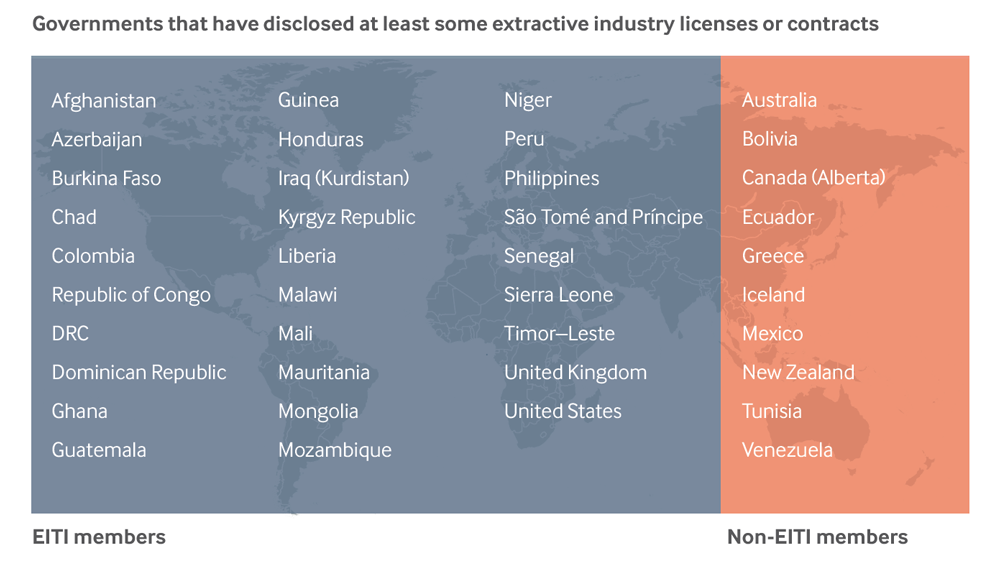
Twelve Ways EITI Stakeholders Can Improve Contract and License Disclosure
Since 2013, the EITI Standard has “encouraged” public disclosure of contracts (see section 2.4 in the latest edition). In a recent report, Don Hubert and I noted that this gave important additional momentum to the issue of contract disclosure. And while it is difficult to attribute causality to policy change, since the release of the 2013 EITI Standard, nine new countries released contracts, and nine enacted laws that require contract disclosure. (See this table for findings for each country including references and links to key documents.)
EITI is now at the center of a global community of contract disclosure in the extractive industries. Three-quarters of the countries that have disclosed extractives contracts or licenses are also part of EITI, as are many disclosing companies and civil society advocates for contract disclosure. Trends in the disclosure of contracts and licenses signal how the EITI community can improve extractive sector governance practices globally. Even though contract disclosure is not a requirement in EITI, many countries have adopted the practice as a result of the global and national debates facilitated by the initiative.
Nevertheless, there is still plenty of room for improvement. At the time of writing, 20 EITI implementing countries had neither published contracts or licenses nor passed a contract disclosure law, while 11 countries had failed to make the disclosures required under national laws. Even in countries where contract disclosure is an established practice, it remains challenging for citizens to determine which contracts or licenses are relevant to active projects. Broken websites and the use of inappropriate file formats hinder access and can make analysis all but impossible.
All EITI stakeholders—both national and international—could do more to improve the scope and quality of contract and license disclosure. The following 12 actions can help.
Disclosure. Increase the number of contracts available to the public.
1. Target countries where laws and implementation do not match.
Eleven countries fail to disclose all the contracts required to be made public under national laws. In these countries, multi-stakeholder groups (MSGs) should highlight inconsistencies between policy and practice, and work to close the gap between law and practice.
2. Put contract transparency on the agenda in countries where it is ignored.
Among the 20 implementing countries that have made no progress on contract disclosure, only 2 included activities on contract disclosure in their 2016 workplans. At the very least, MSGs in these countries should commence discussions on current national policy regarding contract transparency and consider whether improvements in policy should be pursued.
3. Increase knowledge sharing within the EITI community.
National EITI processes have tackled contract disclosure in varied ways. They have facilitated national debate, contributed to legal reforms, supported dissemination of agreements and led education activities to advance understanding of contracts. The EITI international secretariat and support organizations should work to increase opportunities for countries to share experiences on contract disclosure and learn from one another.
4. Improve the comprehensiveness of disclosure.
Of the 29 countries that have disclosed contracts, only 16 disclosed all or nearly all contracts in at least one sector. The reasons for incomplete disclosure vary from country to country, with some more significant (e.g., legislation does not cover specific contracts) than others (e.g., contract not disclosed because it was recently signed). Where gaps in disclosure exist, MSG members should try to determine why, and push for comprehensive disclosure.
5. Confirm the number of contracts or licenses in the sector.
Citizens often struggle to determine which contracts they might access because they lack information about the mere existence of contracts in the first pkace. We recommend that all EITI implementing countries publish and maintain a comprehensive list of all active contracts, annexes, amendments and other related documents, even where the contract itself has not been disclosed. The latest version of this list should be included in EITI reporting in furtherance of EITI requirement 2.1 on disclosure of the national legal framework and fiscal regime.
6. Encourage companies to embrace disclosure.
Companies can advance disclosure, but many choose not to. A number of companies have disclosed their contracts in countries where it is not required across the board, including EITI supporting companies like BP in Azerbaijan, Kosmos in several African countries, and Rio Tinto in Mongolia. Companies should adopt contract disclosure as their preferred practice, and pursue it as widely as possible. They should also proactively comply with existing disclosure rules, rather than being forced to do so.
Access. Make contracts easy to find, browse, search and use.
7. Use effective publication channels.
In our study, the best performing countries published electronic copies of contracts or licenses online, alongside paper-based options to increase accessibility for communities lacking Internet access. But all too often broken websites mean that documents are not easily available. We therefore recommend that implementing countries ensure that national websites are adequately resourced. We also recommend hosting contracts or licenses on multiple websites including national EITI websites.
8. Scrutinize gazette publications.
While several countries require extractives contracts or licenses to be published in the national gazette —the periodical that records the business and proceedings of a government— we could only confirm gazette publication of agreements in two countries. Where governments require contracts to be published in gazettes, MSGs should determine whether this is actually happening. Where gazette entries are not held online, or are not easy to navigate, MSGs should encourage republishing gazette sections containing contracts on a government or national EITI website.
9. Use open file formats.
Most governments currently publish contracts or licenses as image files. These file formats can make the information in contracts harder to use because the text within these files often cannot be searched or easily copied. Implementing countries should publish contracts in open file formats. Platforms like resourcecontracts.org can help countries accomplish this. These documents should be published under an open license to ensure that citizens can use them without restrictions.
10. Publish metadata.
When contracts are disclosed by the dozens, or by the hundreds, sorting through them can be challenging. EITI implementing governments should publish not only the contracts but also additional information, known as metadata, that allows for the documents to be organized by subject matter. Basic metadata includes information like the contract title, contracting parties, signing date and commodity being exploited. Standardized metadata among EITI implementing countries would allow users to search for specific issues and better understand company and government rights and obligations in their country, and around the world. The international secretariat could develop data standards for contracts and licenses by borrowing from the Open Contracting Data Standard and the metadata used by resourcecontracts.org.
Policy. Establish rules to guide disclosure practices.
11. Develop effective disclosure laws.
Our research shows disclosure is more consistent in countries with legal requirements for contract/license transparency. Countries that seek to strengthen transparency should establish contract disclosure policies in a well-established legal instrument, preferably one that covers all relevant extractive sectors. While legal requirements on contract disclosure need not be complicated, there should be clarity on (a) what should be disclosed, (b) the time frame for disclosure, (c) the format of disclosure and (d) what channels should be used for dissemination. All new contracts should clearly state that the contract is a public document and should be made publicly available.
EITI reporting. Provide current information on contract disclosure.
12. Ensure effective EITI reporting about contract disclosure policy and practice.
Section 2.4(b) of the EITI Standard—which mandates implementing countries to disclose government policy on contract transparency, information about contracts in the public domain and any planned reforms—provides an important opportunity for stakeholders to have an open conversation on the issue. Yet, of the 51 countries reviewed here, only 18 were fully implementing these requirements. Common problems included failure to report reforms that were planned or underway, and failure to provide an overview of contracts or licenses in the public domain. To support improved reporting, the EITI secretariat needs to update its guidance on these issues. The ongoing process of EITI validation provides further opportunities to flag and improve reporting shortcomings in this area.
Rob Pitman is a governance officer with the Natural Resource Governance Institute.
Authors

Robert Pitman
Senior Governance Officer
